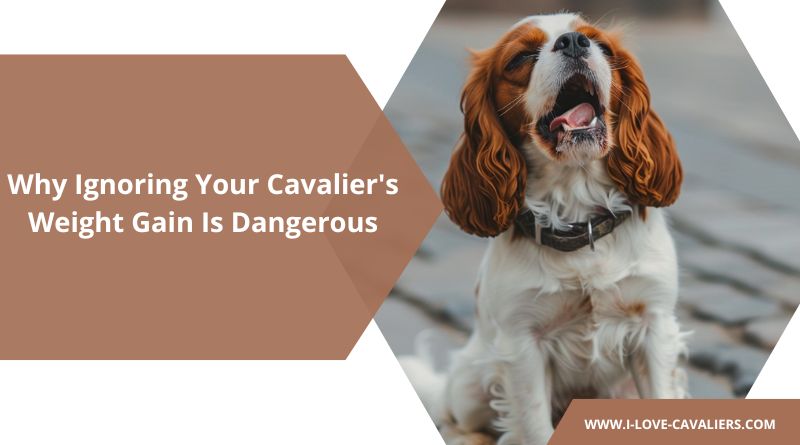Have you ever looked at your Cavalier King Charles Spaniel and wondered if those extra pounds are cause for concern? It’s not just about the snug fit of their collar or how they’ve outgrown their favorite spot on the couch.
Carrying extra weight can significantly impact your Cavalier’s health and happiness, and ignoring it isn’t an option.
Cavalier King Charles Spaniels are known for their loving and gentle nature, but their propensity for weight gain can sneak up on you.
Every extra pound can shorten your Cavalier’s lifespan and make their days less enjoyable.
But here’s the good news—managing your Cavalier’s weight can be a fun and rewarding journey for both of you.
There’s no magic wand, however, but with consistent care and some delightfully long walks, you and your Cavalier will be on the path to better health.
Identifying Weight Gain in Your Cavalier
But how can you tell if your furry friend has put on a few too many pounds? Don’t worry—it’s easier than you think to spot the signs.
Overweight Cavaliers
First off, let’s talk about an overweight Cavalier. Run your hands along your dog’s sides:
- Ribs: Are they playing a tough game of hide and seek? Your Cavalier should have a little fat over their ribs, but you should be able to feel them without a deep search.
- Waistline: Can’t spot that hourglass silhouette from above? Your pooch might be hiding a little extra belly.
Obese Cavaliers
Now, for an obese Cavalier, things are a bit more to the extreme:
- Ribs: Completely missing in action? If you can’t feel your Cavalier’s ribs at all, that’s a red flag.
- Waistline: Look for the waistline or, in this case, the lack of one. A stomach resembling a bloated balloon is a sign that your furry pal has gone beyond overweight.
And here’s another tell-tale sign: activity levels. Has your little furball lost its spring? If you notice reduced enthusiasm for walks or playtime, those extra pounds could be to blame.
Consequences of Ignoring Weight Gain
Have you noticed your Cavalier King Charles Spaniel looking a bit rounder these days? It might seem cute, but the extra weight can spell danger for your furry friend’s health and happiness.
Did you know? An adult Cavalier should eat 375 and 560 calories per day, ideally split over two meals (referring to adult Cavaliers). However, those puppy dog eyes can sometimes lead to overfeeding.
Let’s talk about what happens if that weight isn’t kept in check:
- Heart Disease: Pudgy pooches may look cute, but obesity can be a real heartbreaker. It’s directly linked to heart disease, and because Cavaliers are already prone to such conditions, every extra pound matters.
- Joint Problems and More: Your Cavalier’s joints are like nature’s shock absorbers, but they can’t take endless pressure. Excess weight can lead to achy joints and increase the risk of arthritis and hip dysplasia.
- Diabetes: Just like humans, dogs can get diabetes too, and it’s no walk in the park. Extra weight can lead to insulin resistance, which is the last thing you want for your four-legged friend.
- Complicated Conditions: If your Cavalier isn’t at their ideal weight, treating other health issues can become more complex. Extra fat can affect everything from anesthesia safety during surgeries to the efficacy of medications.
Preventative Measures and Management Strategies
Ok, let’s now talk about keeping your Cavalier at a healthy weight through smart choices.
Balancing the Diet:
- Check Portion Sizes: Overfeeding is a common culprit.
- Stick to the recommended feeding guide for your Cavalier’s age and size.
- What’s in the Bowl?: High-quality food with fewer calories and more nutrients can do wonders.
- Make sure it’s packed with the good stuff!
Creating an Exercise Plan:
- Be Consistent: Daily walks and playtime keep those extra pounds off.
- Tailor the Activity: Adjust the exercise to your pup’s energy level and health.
| Age | Recommended Daily Exercise |
|---|---|
| Puppy | Short, frequent playtimes |
| Adult | 30 to 60 minutes daily |
| Senior | Gentle, shorter sessions |
Veterinary Check-Ups:
- Your Vet Knows Best: Regular check-ups help tailor a weight loss plan just for your buddy.
- Track the Progress: Keep a log of their weight changes.
- A healthy weight means a happy heart for both of you!
